8 mistakes you're making when steaming your clothes – and what experts advise you do instead
Are you guilty of any of these common clothes steamer mistakes?
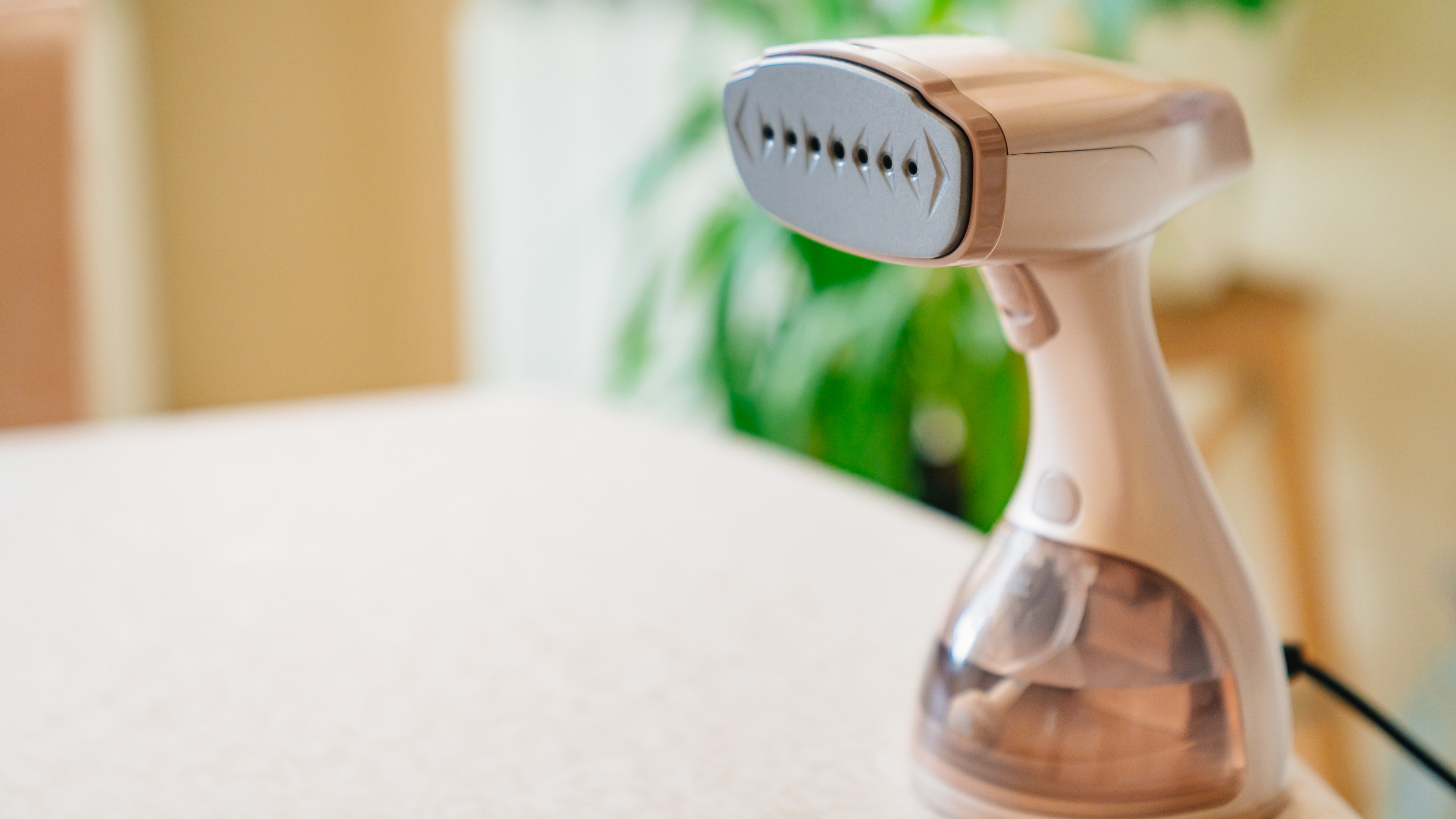
- 1. Using it before it's ready
- 2. Not hanging clothes before steaming
- 3. Not pulling garments taut
- 4. Not checking garment care labels
- 5. Not considering location when steaming
- 6. Not utilising additional attachments
- 7. Not letting clothes dry completely
- 8. Skipping steamer maintenance
- Shop clothes steamers
- FAQs

Clothes steamers are tiny little powerhouses that will help you remove creases and freshen up garments within a matter of minutes. However, if you've found yourself underwhelmed with the performance of your appliance, there's a chance you might be falling victim to a handful of common mistakes people make when using a clothes steamer.
When used correctly, the best clothes steamers are nothing less than a game-changer, even convincing people to ditch the use of their best steam iron. While they're often presented as simple enough devices to get the hang of, there is a slight learning curve to making a clothes steamer work if you want to avoid your clothes just being splashed with water and still being wrinkled at the end of it.
As such, these are the most common mistakes experts see people making when using a clothes steamer – and how you can avoid them.
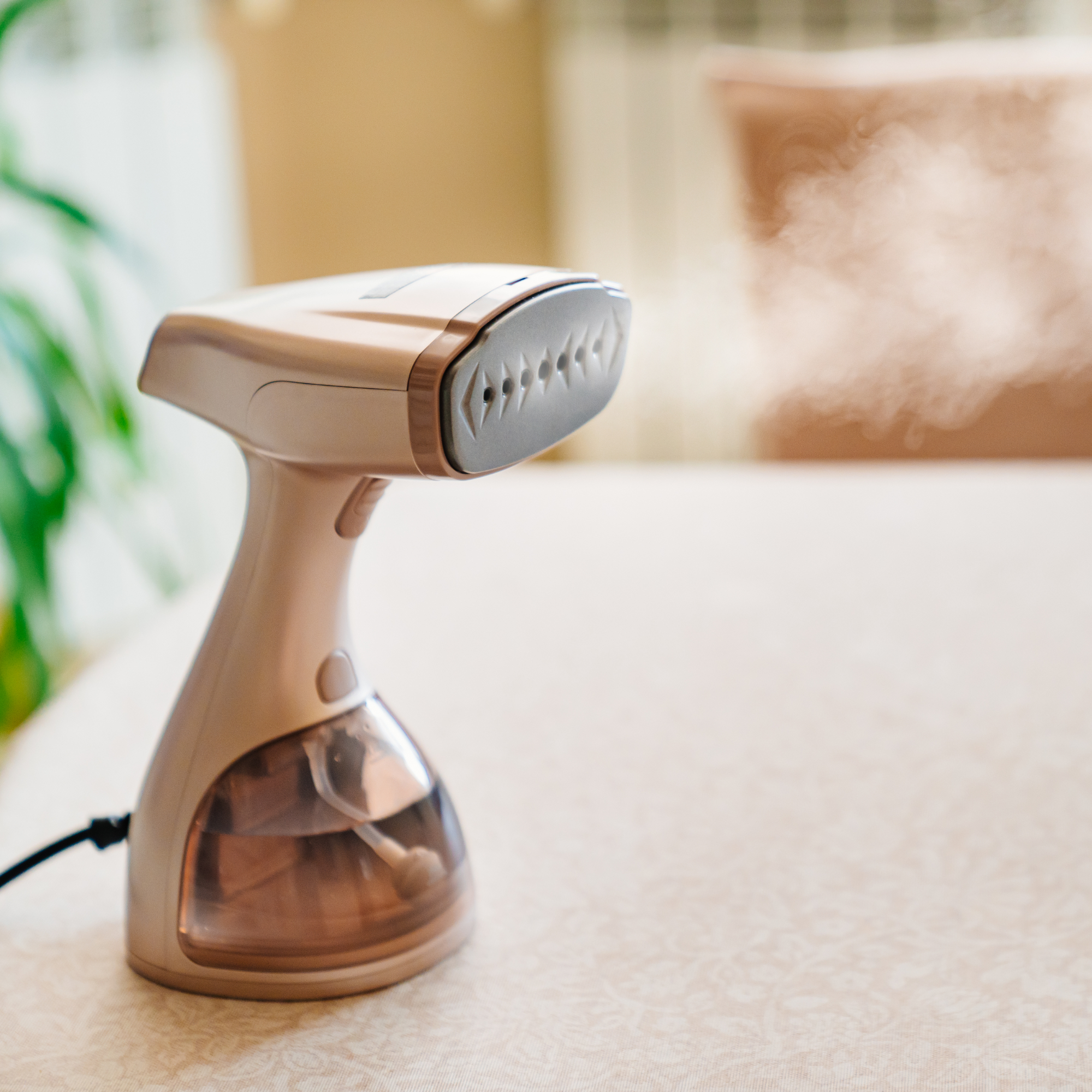
1. Using it before it's ready
While portable clothes steamers are ideal for those times you're in a rush, don't try to start too soon otherwise you'll be left frustrated with the (lack thereof) results.
'It is important to give your steamer time to heat up properly to optimum temperature and avoid using the first output of steam directly on your clothes,' begins Atit Chopra, senior product developer at Beldray.
'We recommend releasing the steam away from your clothes for around 30 seconds until steam is distributed evenly, this prevents you from getting any leftover water residue on your clothes.'
2. Not hanging clothes before steaming
Although using a clothes steamer eliminates the need for an ironing board, you will still have to set yourself up for success by hanging your garments before attempting to steam them.
'Steamers work their best when they are held upright, so using it on its side in a similar manner to an iron can make it harder to remove creases and can also cause water to spill on our garments,' explains Hannah Hamer, product manager at Russell Hobbs.
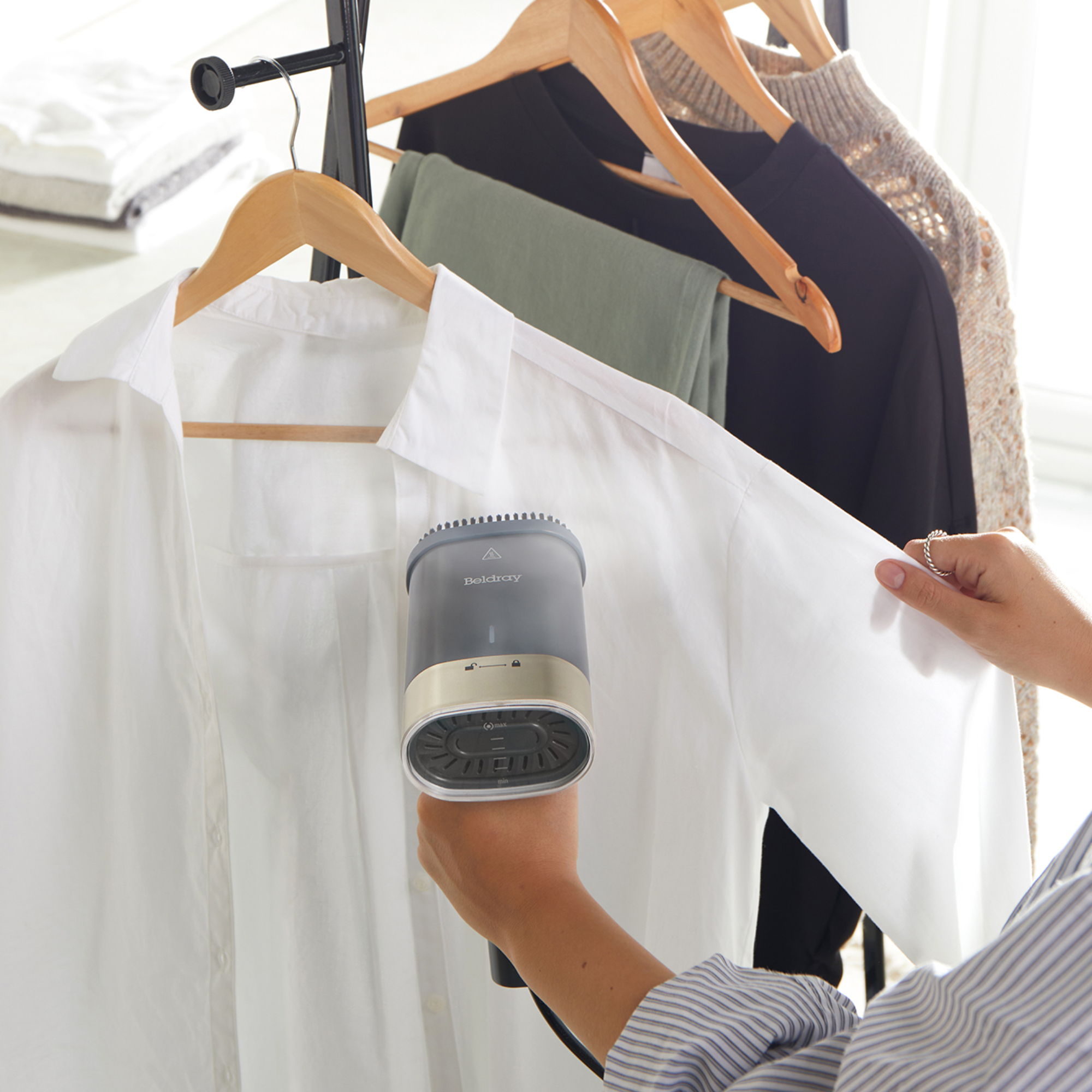
3. Not pulling garments taut
As well as hanging clothes up before steaming them, they should also be pulled so the material is taut rather than hanging loosely.
'Steaming essentially works by relaxing the fibres in the fabric, so if a garment hasn't been pulled tightly, the fibres may dry back to their original wrinkled state,' continues Hannah.
For the best results when steaming your clothes, pull your garments tight from both the bottom and sides.
4. Not checking garment care labels
How close and how long you should hold a steamer on a garment will depend entirely on the material you are steaming, so there is no one-size-fits-all.
This is why it's extremely important to check before accidentally doing irreversible damage to one of your favourite clothing items. In any case, our phones can even help you decipher care labels with this handy iPhone visual look-up hack we discovered.
'For example, when steaming materials such as cotton, wool, and synthetics you can place the nozzle directly onto the fabric as you steam,' says Hannah.
However, Atit urges you to avoid steaming materials with soft plastic pieces, fabrics with embroidery, sequins, or beading. For delicate fabrics like silk and chiffon, for example, Atit recommends steaming them from the inside out to avoid water marks and streaking.
When in doubt, Hannah advises always patch-testing any new fabrics to avoid any damage and refer to your product manual for best results.
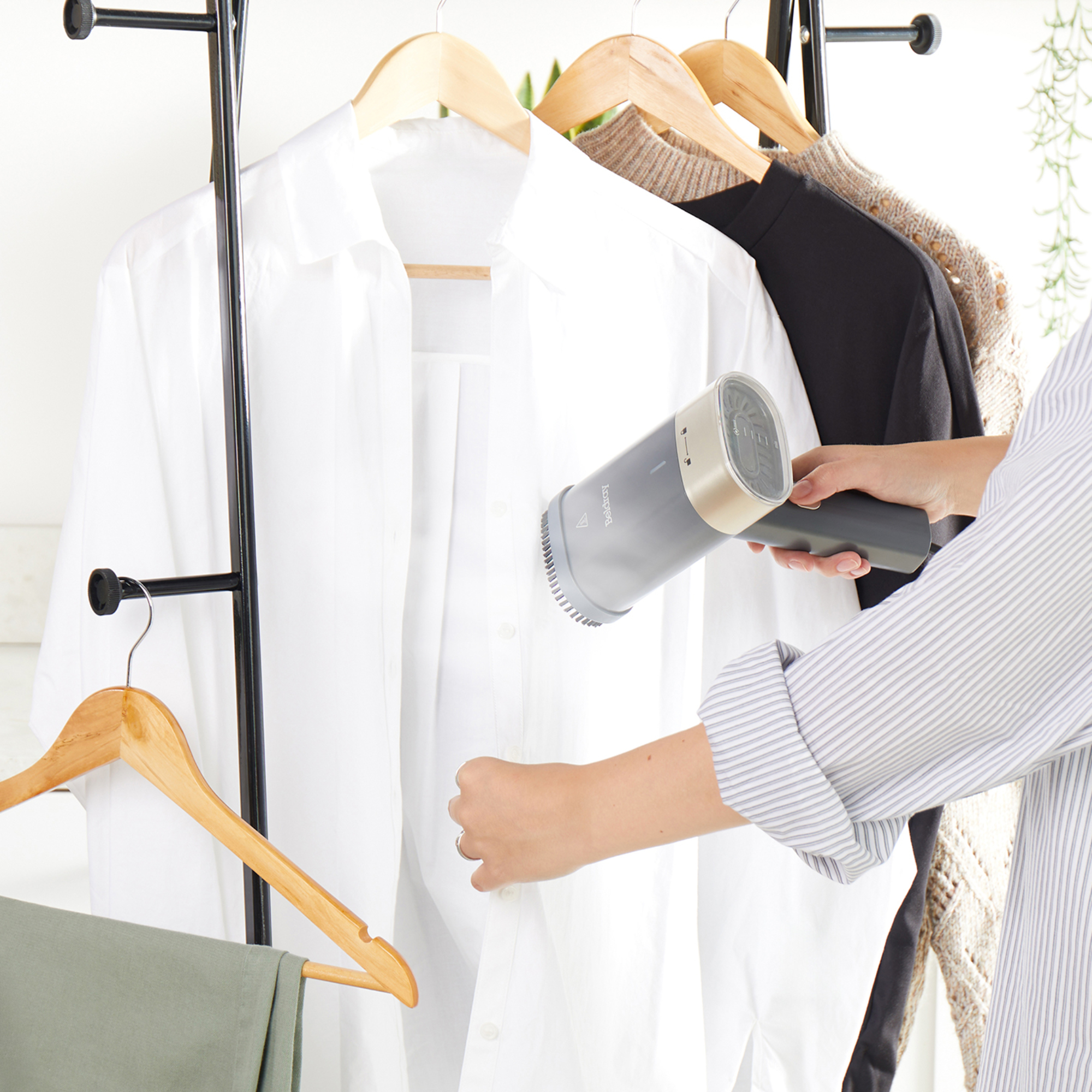
5. Not considering location when steaming
This isn't about the placement of a steamer on clothes, but rather about the actual location you've chosen to steam your clothes in.
When hanging clothes up to prepare them for steaming, Atit urges you to ensure the surface you are steaming on isn't liable to water damage, such as the back of a door with exposed wood.
'To protect your surfaces, we advise using an overdoor, heat-reflective pad,' says Atit. Not only will this keep your surfaces safe, but the heat-reflection can also act in a similar way to the tinfoil ironing board hack to make the appliance work more effectively.
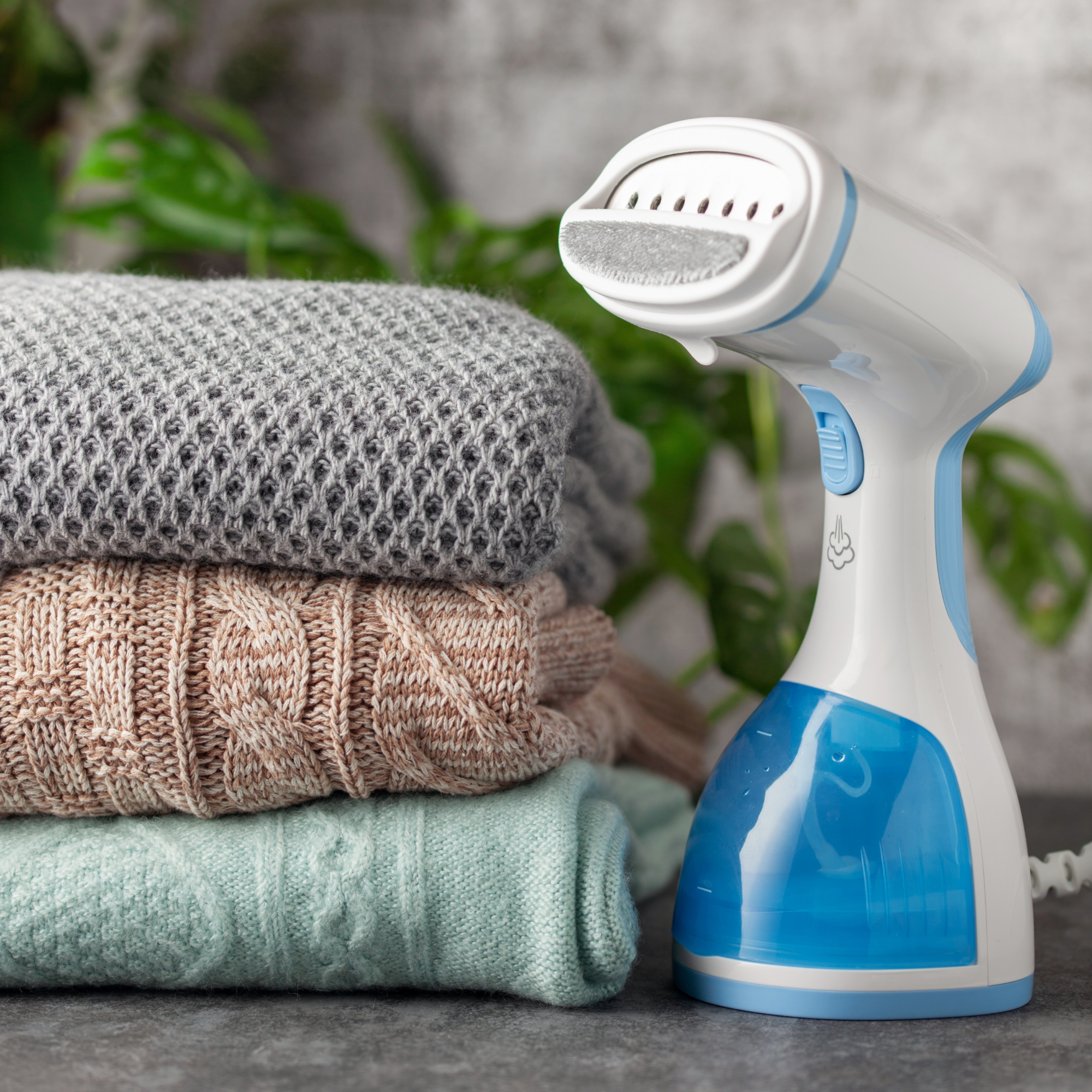
6. Not utilising additional attachments
One of the biggest and often overlooked people make when using a clothes steamer (or any appliance, for matter) is underutilising its additional attachments which Hannah explains 'can be fantastic for delicates or steaming upholstery, and help you get the out of the steamer by utilising them on the right surfaces.'
'Not utilising garment steamer accessories and attachments may mean you are not getting the most out of your steamer,' explains Atit. Considering you've invested, it's worth using it to its full capabilities.
As mentioned, these accessories can include anything from an upholstery attachment to help with the task of cleaning a sofa, a lint brush to remove unwanted fluff or hair, and tool attachments for steaming more delicate fabrics.
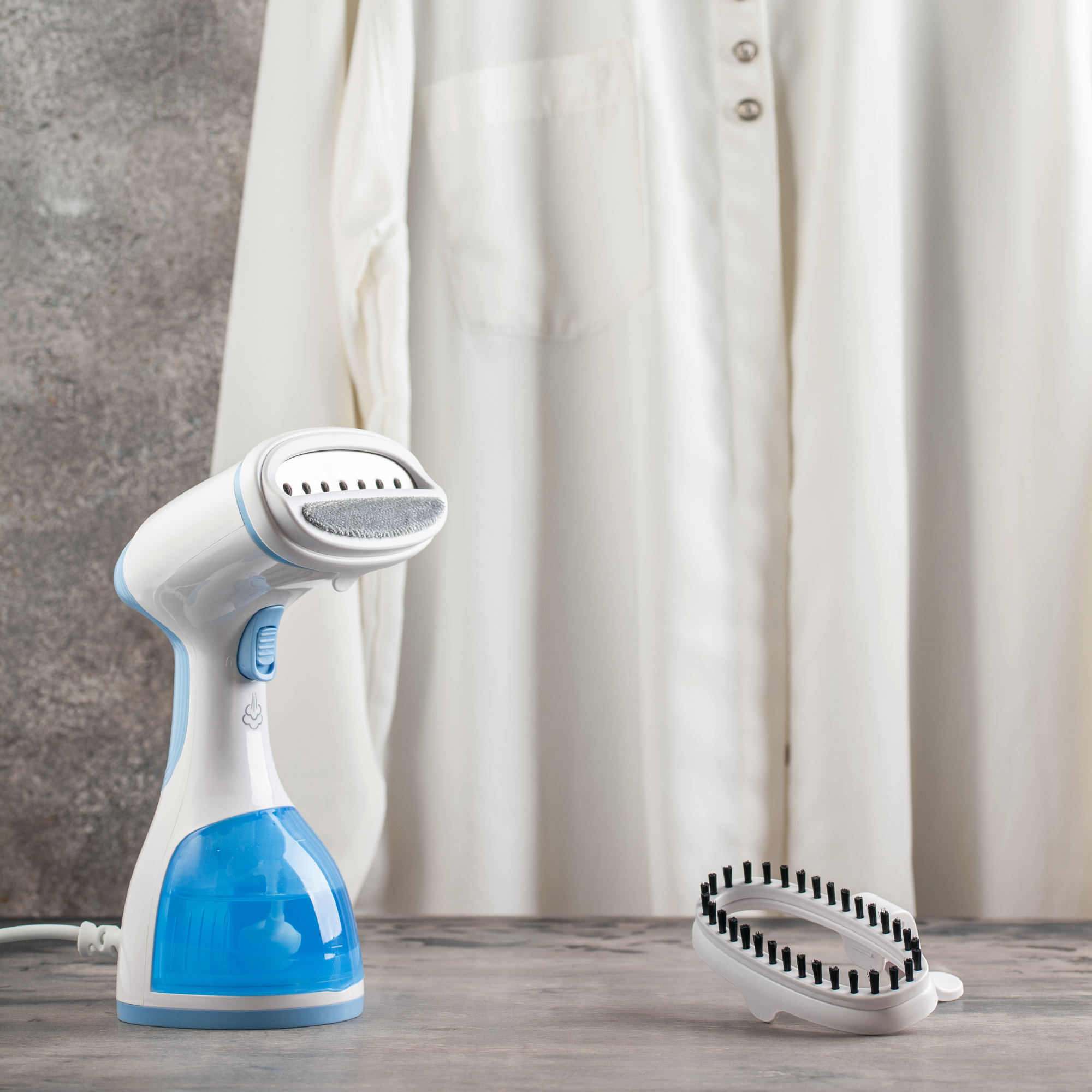
7. Not letting clothes dry completely
Since we're working with steam here, you must allow your clothes enough time to dry completely after steaming.
If not, this can lead to your clothes becoming creased again if you try to handle them while they're still cooling down and drying; or worse, resulting in mildew if you immediately store them with other clothes in a wardrobe.
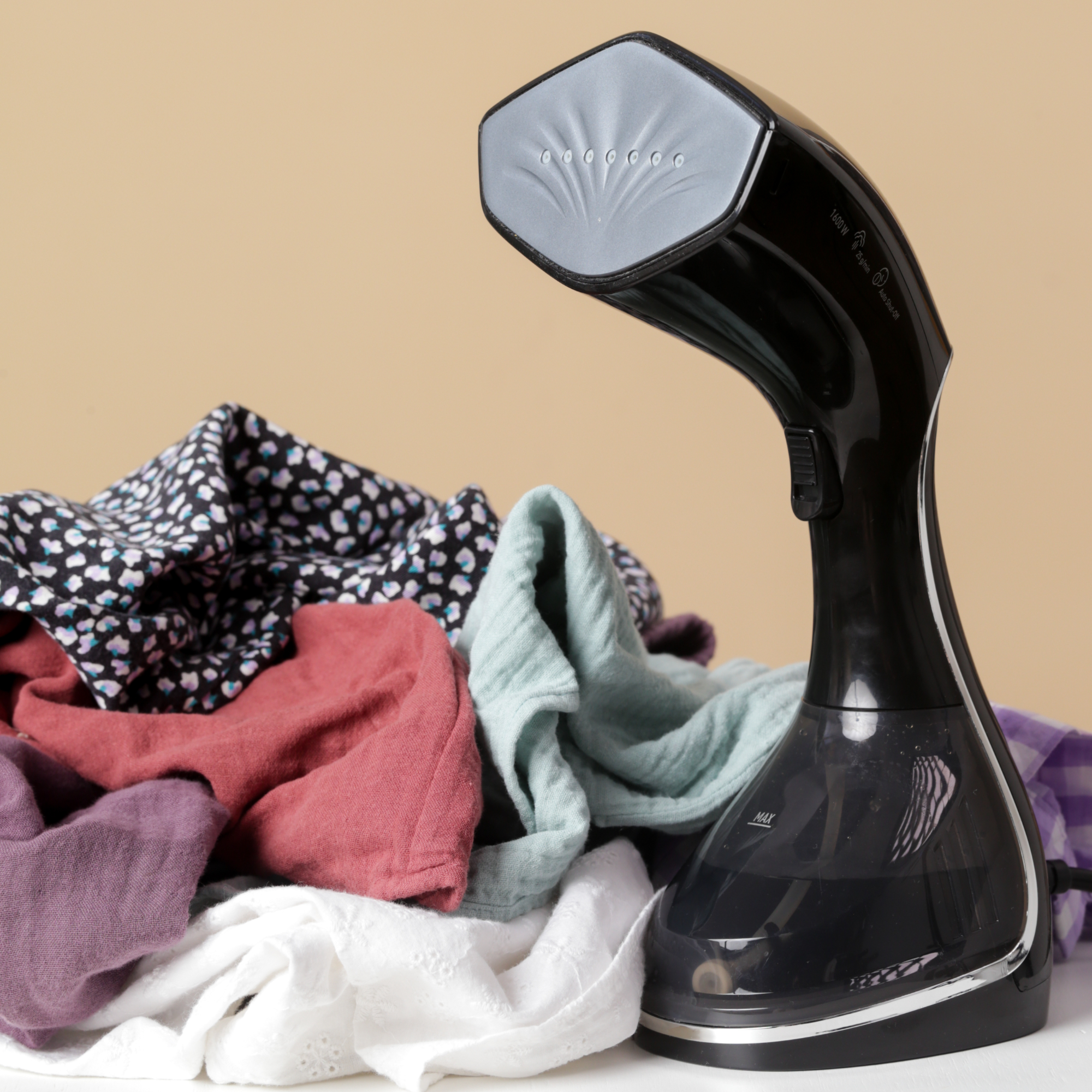
8. Skipping steamer maintenance
Just like clothes ironing mistakes, failing to maintain upkeep on cleaning your clothes steamer is one of the worst things you can do for the effectiveness and lifespan of your appliance.
'It’s important to clean your steamer thoroughly every few months to get rid of any hardened residue to not only extend the appliance's life span but also protect your garments from any unwanted marks. We recommend emptying the water tank after every use and would advise those living in hard water areas to use distilled water to prevent any corrosion,' advises Hannah.
Shop clothes steamers
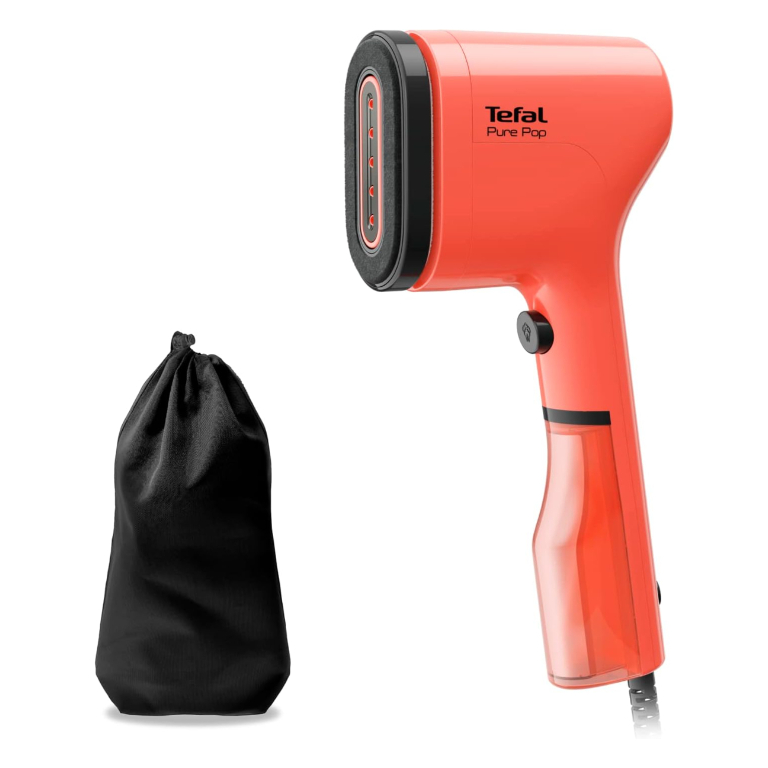
This is the clothes steamer I own, and I love it and would recommend it to anybody looking for an affordable option that doesn't scrimp on quality. It even comes in a convenient travel pouch.
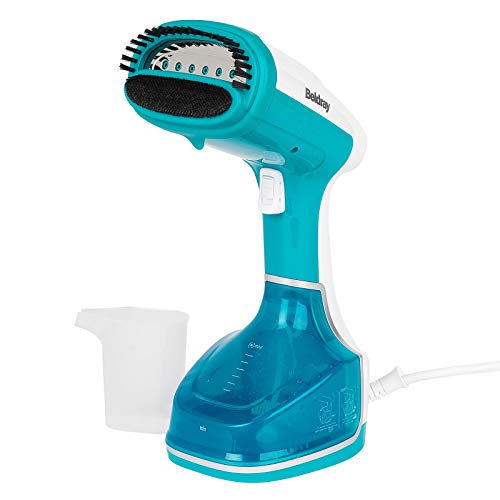
This handheld clothes steamer will leave garments smooth and crease-free. Ready to use in just 45 seconds, it's designed with practicality and convenience in mind.
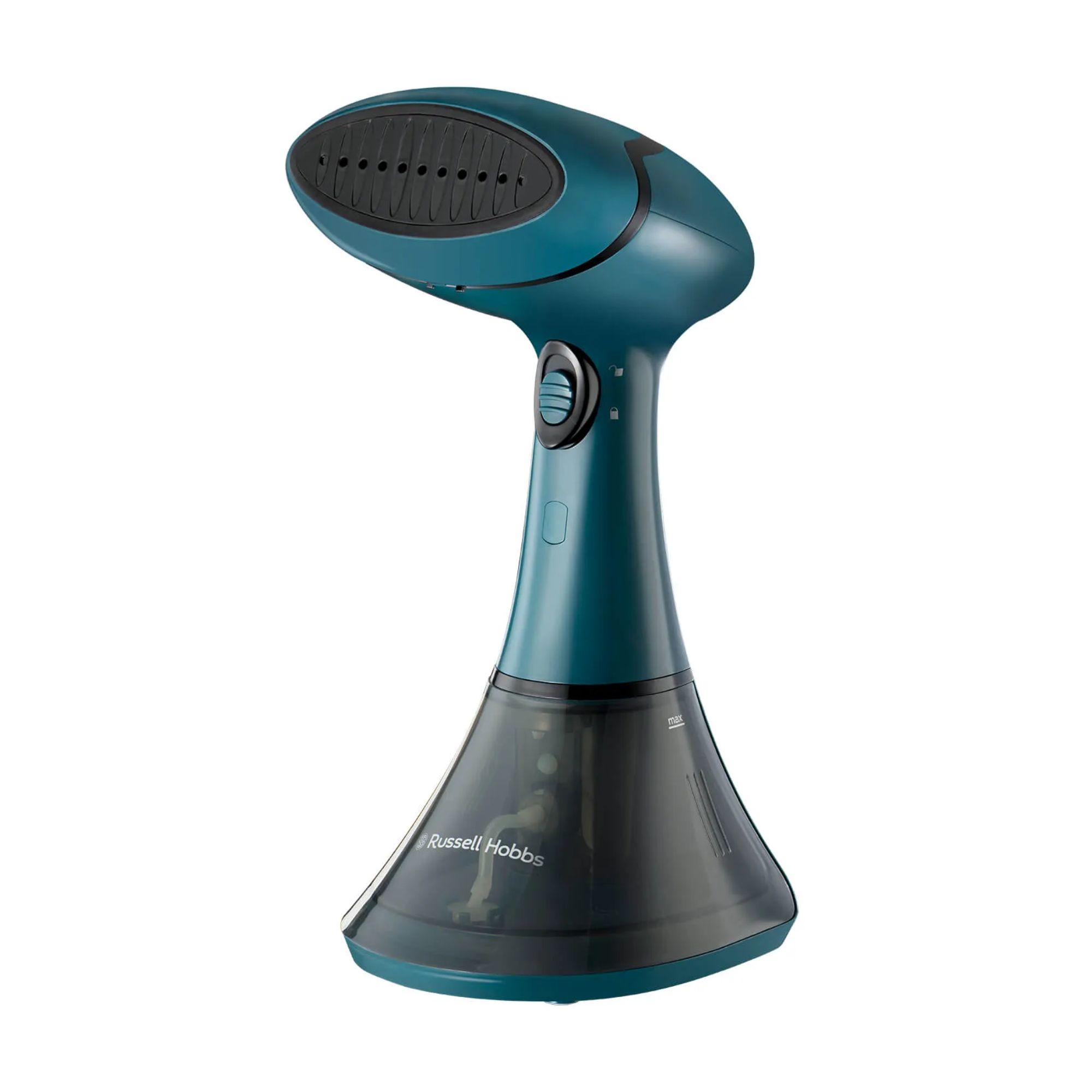
Sporting 3 additional attachments, this Russell Hobbs handheld clothes steamer is perfect for freshening up garments, steaming upholstery, and also removes excess lint and hair from fabrics.
FAQs
How do I get the best results from a steamer?
'To achieve the best results with a clothes steamer, I recommend hanging the garment properly to give the steam room to properly penetrate the whole of the material,' begins Henrique Conceicao, area manager at Total Clean.
'You can avoid leaving unsightly marks by sticking to smooth, downward strokes and holding the steamer at a slight distance from the fabric to prevent excess moisture build-up.'
What fabrics should not be steamed?
'To prevent damage to your clothes, make sure they are safe to be steamed. Avoid steaming materials with soft plastic pieces, fabrics with embroidery, sequins, or beading,' urges Atit Chopra at Beldray.
'With delicate fabrics like silk, and chiffon, we recommend steaming them from the inside out, to avoid water marks and streaking.'
Now you know what to avoid when steaming your clothes so you can ensure you get the best and most effective use out of your clothes steamer for years to come.
Get the Ideal Home Newsletter
Sign up to our newsletter for style and decor inspiration, house makeovers, project advice and more.

Jullia was Ideal Home’s Junior Writer from 2022-2024 and the Ideal Home Certified Expert in Training on Vacuums having spent over 60 hours testing different models. She’s always loved all things homes and interiors, graduating with a bachelor’s degree in Architectural Studies from the University of Nottingham where her love for writing blossomed following her internship at ArchDaily. Now focused on home tech and cleaning, Jullia works on writing features and explainers to help people make the most of their home appliance investments, putting the newest launches through their paces. When she isn’t writing, she loves exploring the city, coffee shop hopping, and losing hours to a cosy game or book.
-
 Moving from the city to the country transformed this family's life
Moving from the city to the country transformed this family's lifeA sympathetic restoration and a modern extension have given this period property a new start as a practical family home
By Louise O'Bryan
-
 Sorry florals, botanical patterns are trending for 2025 – interior experts share the best ways to make them work in your home
Sorry florals, botanical patterns are trending for 2025 – interior experts share the best ways to make them work in your homeEmbrace bold blooms in your scheme
By Maddie Balcombe
-
 Are rainfall shower heads out of style in 2025? These 3 alternatives could be the next best thing
Are rainfall shower heads out of style in 2025? These 3 alternatives could be the next best thingIt could be time to try something new
By Holly Cockburn